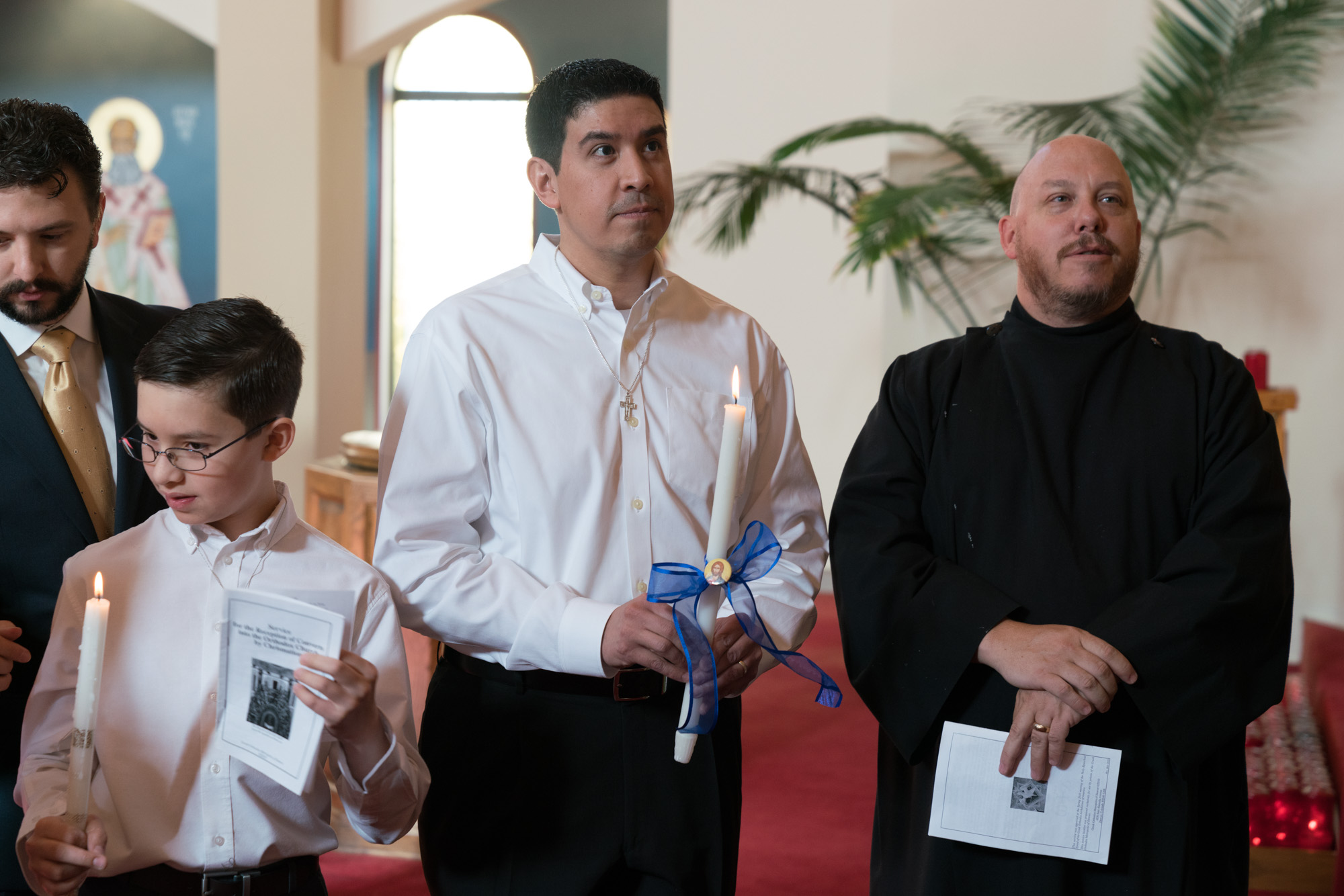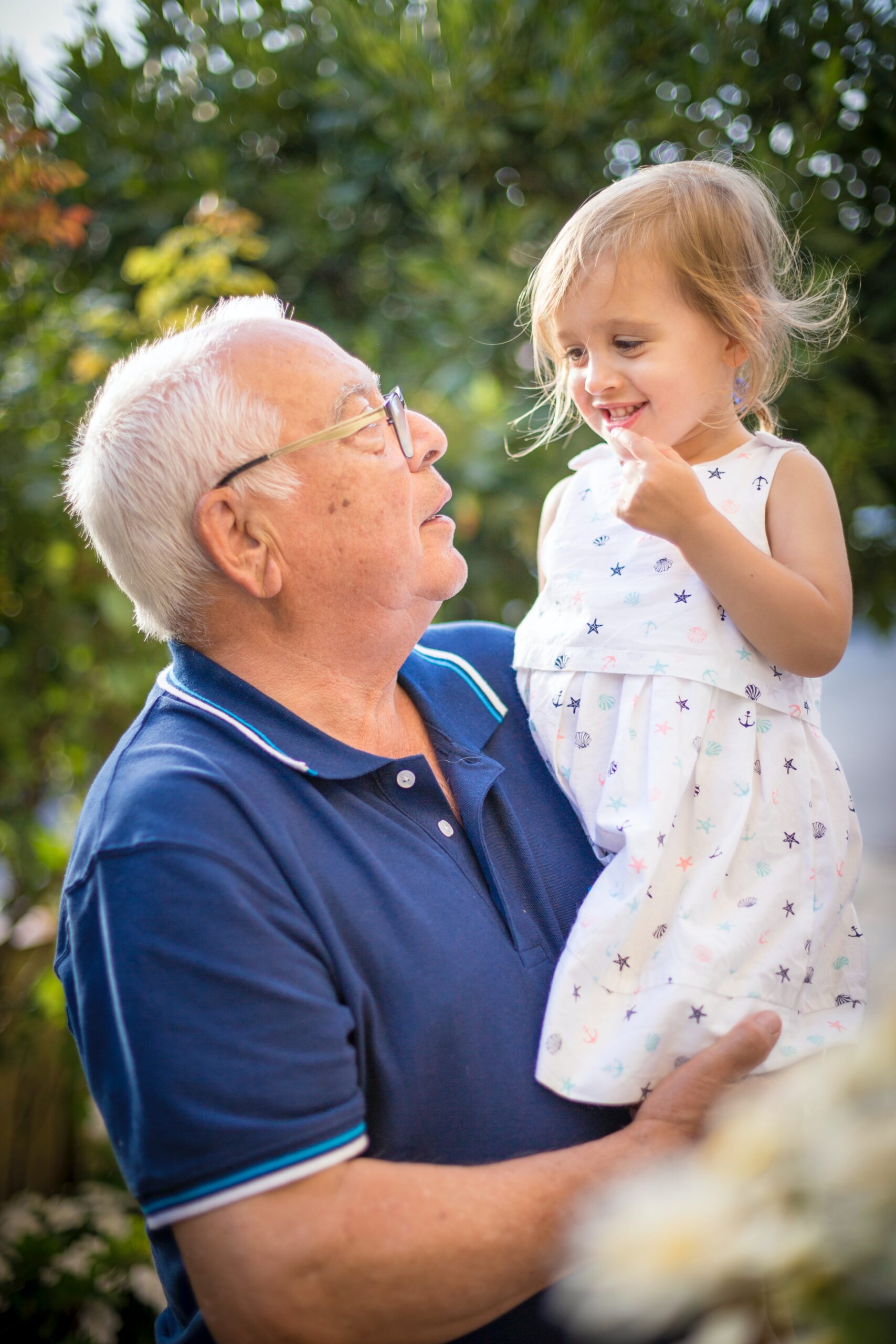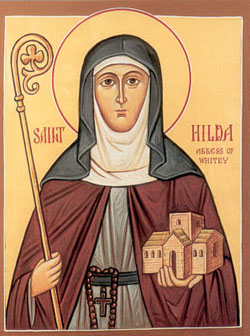A few years ago my friend and her family were received into the Orthodox Church. When our priest prayed for the Luceros they did not stand by themselves. In fact, if they wanted to join the Church on their own, they would not be allowed, because the Church is not a gathering of individuals; it is a Eucharistic community.
In a beautiful practice birthed in the ancient wisdom of the Church, each newcomer must be sponsored by a member of the community. Each family member’s godparent stands with them on the solea and vows to nurture and encourage their godchildren in their Orthodox Christian journeys.

This is spiritual family in reality, not theory, and it is the opposite of the radical individualism that defines so much of 21st-century religion.
A Collection of Individuals
Of course, the concept of a spiritual family is not limited to Orthodoxy. In the Protestant world I was taught this important understanding of the Church as the body of Christ, united by Jesus as the Head, with a variety of members with different gifts and callings.
Protestants call each other brothers and sisters, and they mean it. Beyond the fractious disagreements between various churches and sometimes inside them, they speak and sing of a unity and a oneness that, through the grace of the Holy Spirit, transcends our weaknesses and differences.
Yet, like so many Bible-based teachings in the Protestant world, this belief in a spiritual family is a matter of intellectual assent to a propositional truth, with no Holy Tradition to make it visible in an earthly way. Our adoption as children of God comes through the work of Christ (Gal. 4:4-5), but the sense of individualism remains.
People join a church on their own, or together as nuclear families connected by blood and marriage. They are not sponsored by other believers in any agreed-upon way. The process varies from church to church, as do the statements of faith to which they agree.
The family commitment to one another is intangible, entered into individually, and lasts…until it doesn’t work for the individual anymore.

In reality, when the spiritual family splits, or a group of people leave to join a different congregation or to form its own church, the splinter group simply becomes part of a different family.
Unity is elusive. People come and go, not just because of job transfers and other life changes, but because congregations fracture. Pastors move on, and a chunk of the congregation follows them; doctrinal change leads to a drop in attendance; the megachurch down the street offers more exciting programs; people divide into camps over musical style or charismatic expression. The spiritual family splinters.
Family Traditions
Of course, the Orthodox Church is filled with messy, fallible humans, too. We bicker, we judge, we hold onto resentments. We often don’t admit our sins, much less confess them. We’re yet another big, dysfunctional family.
But the Orthodox Church is a spiritual family by design, with a network of intentional relationships.
The Lucero family’s chrismation is an example of this design. The Holy Tradition of godparenting, where a committed member of the Body of Christ sponsors a newcomer, turns the concept of spiritual family into tangible, flesh-and-blood reality.
Joining the Church is a spiritual form of adoption, and babies don’t adopt themselves. Just as infants are taken in by actual families who commit to raise them, Orthodox Christians are sponsored by people who vow to help raise them spiritually within the larger community of Faith, teaching them the ways of the Church in their journey with Christ.

These ties are real and meant to last. For those who take these connections seriously, godfamilies are a wonderful blessing. A dear, older friend of mine who tells everyone, “Just call me Yia-yia” (Greek for “grandma”), had always wanted a big family. Although that particular dream did not come to pass, God has given her multiple godchildren. When I see her on Sundays surrounded by her daughter’s family and her goddaughters, I smile. Likewise, new convert Laura is a single woman, but she always has family to sit with at church.
In the communion line, a childless couple brings their infant godson to the chalice. Behind them, Rachel is holding the hand of Sara’s daughter in her princess dress while husband James carries his godson, in his little cowboy boots, on his hip. Their own children are elsewhere in the line with their godparents. My godmother Judy often slips in line behind me so that we can commune together.

As I watch people on Sunday mornings, noting the networks of blood, marriage, and spiritual ties that weave through our parish, forming a web of connection, I am filled with a sense of settledness—a sense of “home.”
Each parish family also has a spiritual father in their priest, embodying the longing in St. Paul’s words: “For though you might have ten thousand instructors in Christ, yet you do not have many fathers; for in Christ Jesus I have begotten you through the gospel” (1 Cor. 4:15).
My priest is not a distant pastor known only for his preaching; he truly functions as a spiritual father. He knows me, prays for me and my family, administers the “medicine of immortality” to his children in need of healing, listens to my confession, and takes time to meet with me when I need counsel. The essence of his vocation is more than preaching and teaching; it is one of spiritual fatherhood.
Extended Family
My Orthodox spiritual family is also spread out geographically, with a unity of doctrine that brings stability to this family of faith. Whether I am out of town or out of the country, I can visit an Orthodox parish and know that we share the same doctrine and serve the same Divine Liturgy. The melodies and language may differ, with different customs practiced in different homes, but these “family values” are consistent.
My extended Orthodox family also crosses time. Like treasured family portraits passed down through the generations, the icons on our church walls and in our homes remind us of a family line that can be traced back for two millenia.

The saints’ stories are our family stories, tales of struggle and sacrifice that inspire us to carry on the tradition of Faith.
Of course, people fall short. Some parishes act like ethnic clubs, failing to offer hospitality to the visitors in their homes; some godparents move away or abandon their spiritual parenting duties; some priests are better at shaming than at shepherding. But the vision remains, of one body of Christ, one family worshipping and serving together, bound together with relational ties.
We are knit together by God’s grace and the work of the Holy Spirit, and also by the Church’s design.
We stumble, we fall, we shirk our responsibilities. But in Christ we are not alone. And in a very real and human sense, through the presence of the saints and the Church’s Tradition of godparenting, we are not alone.
We are family.
Any advice on how to integrate into a church community? I have been attending a small parish (the only one around) for almost a year and just became a catechumen. The priest is a convert and we get along great, but the only other connections I have made so far have been other catechumen and seekers. The established community avoid me and many of the older, eastern european women give me the stink eye. I admit I am a little shy, but I am always polite and go out of my way to greet people, but still I get the feeling that I am an outsider who is in the way. At this rate, If I have to wait for sponsorship, I may be waiting awhile. Pray for me.
Hi, Jeff, I wish I could say that your situation is unusual, but it’s not. I know of some parishes that essentially have two separate congregations under one roof—the newcomers and the old guard. May God help those priests!
It sounds like you are doing the right thing, showing kindness to others regardless of their response. Talk to your priest about the situation (if you haven’t already). He may think of someone to sponsor you. And perhaps there are areas of service where you could lend a hand and build some connections. (Is there an adult education class or men’s spiritual study? Choir?) In the meantime, ask God to make a way and also ask our blessed Theotokos for her prayers. I’ll be praying with you!